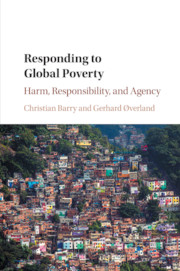Book contents
- Responding to Global Poverty
- Responding to Global Poverty
- Copyright page
- Contents
- Preface
- 1 Introduction: Assistance-based and Contribution-based Responsibilities to Address Global Poverty
- Part I Assistance-based Responsibilities
- Part II Contribution-based Responsibilities
- Part III Implications of Contribution
- Bibliography
- Index
- References
Bibliography
Published online by Cambridge University Press: 13 October 2016
- Responding to Global Poverty
- Responding to Global Poverty
- Copyright page
- Contents
- Preface
- 1 Introduction: Assistance-based and Contribution-based Responsibilities to Address Global Poverty
- Part I Assistance-based Responsibilities
- Part II Contribution-based Responsibilities
- Part III Implications of Contribution
- Bibliography
- Index
- References
- Type
- Chapter
- Information
- Responding to Global PovertyHarm, Responsibility, and Agency, pp. 244 - 255Publisher: Cambridge University PressPrint publication year: 2016



